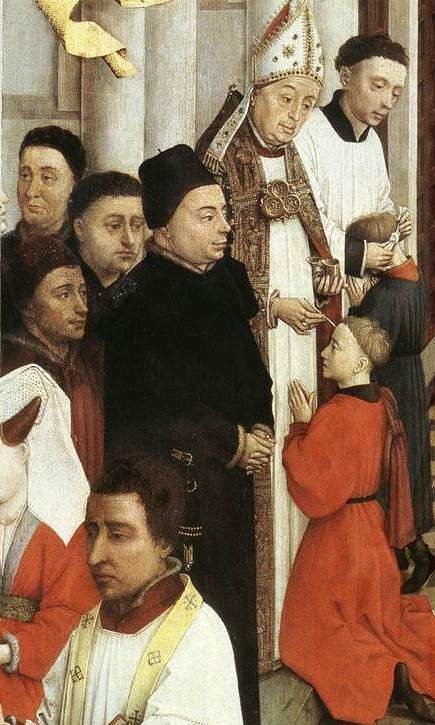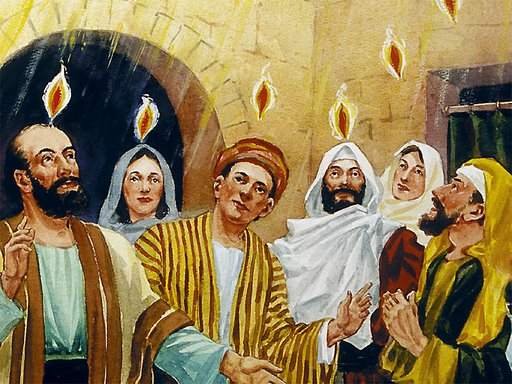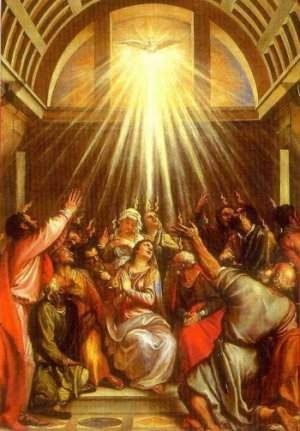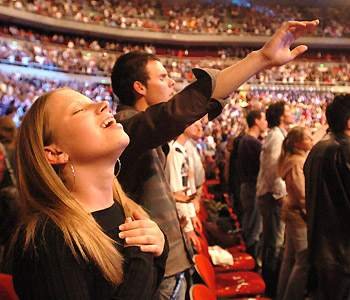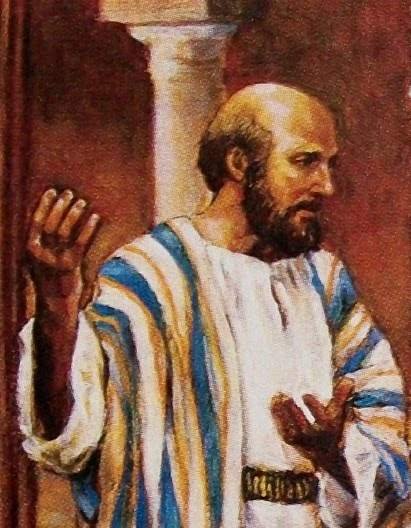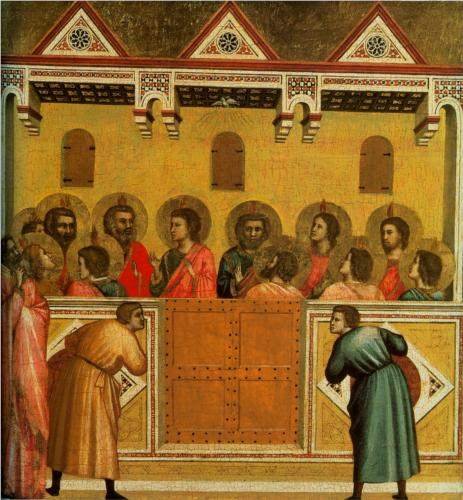
Pentecost (1310), by Giotto.(WikiPaintings.org)
So I’ve written a bit introducing the Sacrament of Confirmation, what it is and what it means; I’ve explicated Confirmation as it appears in Scripture and in the early Fathers of the Church; now I’d like to explore a bit the meaning of Confirmation among our separated Protestant brethren.
Since the practice of Confirmation in the Church is so well attested from Scripture forward, the earliest Protestant reformers didn’t outright reject it. The more liturgical, traditional Protestants — Lutherans, Anglicans, and Methodists, apparently some Presbyterians* — have retained Confirmation in some form. Because there is no explicit scriptural testimony that it was instituted by Christ Himself, however, these Protestants have generally held it not to have sacramental value. These groups, speaking generally, consider Confirmation to be a public profession of faith for children coming of age who wish to publicly embrace their Christian faith, a reaffirmation of the baptismal vows for those who were baptized as infants, and the end goal of a curriculum of catechesis (q.v. Calvin on Confirmation).
* It seems, from my cursory googling, that it’s mostly PCUSA Presbyterians who do this, and not the more hard-core PCA and OPC. Do I have any Presbyterian readers who can give me the info?
Most evangelicals, on the other hand, have completely rejected the practice of Confirmation as unbiblical — since the church can’t do anything that’s not in Scripture.† Most of these churches, in the Baptist tradition, practice believer’s baptism (the baptism only of adult believers, not infants), and for them Baptism takes the place of Confirmation as a public profession of faith for children coming of age and new believers.
† They’re not looking hard enough, in any case. It’s plain enough that the scriptural references to the laying on of hands refer to some formal act of the Church related closely to Baptism and the receiving of the Holy Spirit. Call it Confirmation or call it something else; debate what it means; but it’s there.

This was labeled, in Google Image Search, as a “baby dedication” — but that looks an awful lot like a baptismal font to me.
The Completion of Baptismal Grace
And this is where, believe it or not, I feel we have some common ground. Though many of these groups consider it immoral and incorrect and unbiblical to baptize infants (or downright heretical if one is also Catholic), the practice of these churches outwardly is not completely alien from that of Catholics. Many of these communities, instead of infant baptism, have a rite of baby dedication that in many ways (by design, I think) mirrors a Catholic infant baptism. The child is dedicated to God, and the parents, and other family members, and the whole congregation, promise to diligently raise him or her up in the Christian faith. Likewise in the Catholic rite of baptism for an infant.
I have never understood,
even when I was an evangelical, the evangelical objection to infant baptism. It seems in all literature I have ever read, especially from the Baptists, to be a vehement and visceral denial. “We do NOT believe in infant baptism,” any Baptist document is strident to point out. What are they afraid of — of appearing too Catholic? If Baptism is not sacramental, and is only a sign or public profession, why should it matter, regardless of what one church believes, how another church decides to present its public signs? But it does: paedobaptism (the baptism of infants) is often a major theological point of division among evangelicals, and has been, for many Catholic converts of an evangelical background, a major stumbling block.
At the other end, both Catholics and evangelicals have a rite of coming of age, of children reaching the age of reason and publicly professing to embrace the Christian faith. For evangelicals, it is Baptism, but — here’s the thing — for Catholics, Confirmation is part of the same process as Baptism. Confirmation is the completion — the confirmation — of the baptismal grace the believer received as an infant. I would present to my Baptist friends that Confirmation for Catholics functions in the same way as Baptism does in their churches, and is in truth part of the same movement of the Holy Spirit.
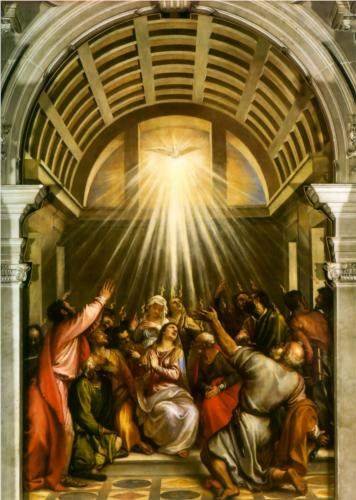
Pentecost (c. 1545), by Titian. (WikiPaintings.org)
Pentecostal Fire
I’ve discovered another parallel in outward forms to Catholic Confirmation among Protestants — and they have no idea. It comes from the very neck of the woods from which I hail: the Pentecostal or Charismatic movement. I have mentioned it once before, almost exactly a year ago, and I wondered what it meant, without ever realizing that it ran parallel to the Sacrament of Confirmation: what Pentecostals call “the baptism of the Holy Spirit.” The Scriptures they read in the Acts of the Apostles as describing this second “baptism,” separated from the context of Church Tradition, are in fact the very passages that I have described that give the earliest accounts of Confirmation.
For Pentecostal churches, in particular the Assemblies of God in which I grew up, the Baptism of the Holy Spirit is necessarily accompanied by the evidence of speaking in tongues. They read in the Book of Acts that the descent of the Holy Spirit, in every case that it is mentioned, beginning with Acts 2, is accompanied by speaking in tongues and prophesying. In particular they note the incident in Acts 19 in which St. Paul “laid his hands on [believers]” and “the Holy Spirit came on them, and they began speaking in tongues and prophesying” (Acts 19:1–7). And this is commonly how Pentecostals receive the Baptism of the Holy Spirit: by having other believers lay hands on them and pray that the Holy Spirit falls on them. This laying on of hands, in Acts, is precisely what we Catholics read as the Sacrament of Confirmation.
The Assemblies of God believe:
The Baptism in the Holy Spirit is a vital experience of the Christian life. It is a special work of the Spirit beyond salvation. On the Day of Pentecost, disciples who had already made a decision to follow Jesus “were filled with the Holy Spirit and began to speak in other tongues” (Acts 2:4). Paul asked the Ephesians disciples if they had received the Holy Spirit, after which “the Holy Spirit came on them, and they spoke in tongues” (Acts 19:2). New Testament believers were constantly challenged to be filled with the Spirit (Acts 1:4,5; Ephesians 5:18). The Assemblies of God is committed to the baptism in the Holy Spirit because the experience is such an important focus of New Testament Christianity.
And strangely enough, they kind of get it.
Most Protestant Christians do not acknowledge any further sense of receiving the Holy Spirit in one’s life after their initial regeneration, when the Holy Spirit first comes to them (we believe this happens at Baptism). I am not sure what other evangelical Christians make of these passages of Scripture that Pentecostals have built their doctrine upon, but in my days I’ve never heard of such a thing discussed.
But we Catholics understand that the Sacrament of Confirmation “in a certain way perpetuates the grace of Pentecost in the Church”; that it is “the special outpouring of the Holy Spirit as once granted to the apostles on the day of Pentecost” (CCC 1288–1288,1302–1303). We believe that it, among other graces, “increases the gifts of the Holy Spirit in us.” This sounds in every way like the “Baptism of the Holy Spirit” I grew up with.
We Catholics believe that only a bishop has the authority to celebrate the Sacrament of Confirmation, or a priest to whom he delegates the authority (this actually goes for all of the Sacraments save Baptism). And, I can say without hesitation that Confirmation, spiritually, was for me unlike anything I’d ever experienced before. But, as I have written before, though God has instituted the Sacraments, He Himself is not bound by them (CCC 1257). It may be that in some portion, Pentecostals, in praying to receive the outpouring of the Holy Spirit, are given what they ask, by the overabundant grace of our God.

